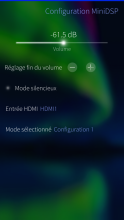MiniDSP Remote
This app is a remote control for the MiniDSP NanoAVR devices. It is useless if you don't own such a device (does nothing on its own). It offers the same set as the vendor android app (volume control, preset and hdmi source selection). Source is on github: https://github.com/Julien-Blanc-tgcm/minidsp_remote
Category:
Keywords:
Application versions:
| Attachment | Size | Date |
|---|---|---|
| 68.41 KB | 08/04/2020 - 08:47 | |
| 66.92 KB | 29/03/2020 - 12:04 |
Changelog:
(none)



Comments
sdiconov
Tue, 2020/03/31 - 11:47
Permalink
I understand that it does not decode dts/dd. But my AVR does it very well. Will the miniDSP device let the non LPCM streams through transparently without correction? What are the EDID issues? I use a computer as player and it connects through HDMI for 5.1 playback. Newer miniDSP devices rely on analog connections, and thus are useless.
JulienBlanc
Wed, 2020/04/01 - 23:05
Permalink
I don't think it can passthrough, but i think you can ask that on the minidsp forums. I use it as a preamp (the version with analog output), feeding it only with LPCM data.
As for EDID, the nanoavr alter the device EDID to insert its own audio capabilites, so that it is seen as 8 channel even if the actual display device has none or less. But sometimes, the EDID seems altered in a wrong way, which results in invalid checksum issues. I ended up forcing the EDID in my linux computer, which works fine.
sdiconov
Mon, 2020/03/30 - 19:09
Permalink
Is nanoAVR able to passthrough DTS & DD streams? The app makes me consider buying it. Is it possible to perform calibration without Windows?
JulienBlanc
Mon, 2020/03/30 - 20:27
Permalink
No DTS for the nanoAVR. It only works with linear PCM.
For calibration, you can use RoomEQWizard on linux, but you need their windows app to load the correction profiles (i don't plan to develop this app outside the basic functions, reverse engineering their protocol is time consuming – and they already said they won't open it).
Also note that it is a discontinued product, which has some annoying issues which will probably never get fixed (very bad EDID behaviour). Outside that it’s a great product for room correction and/or speaker correction.